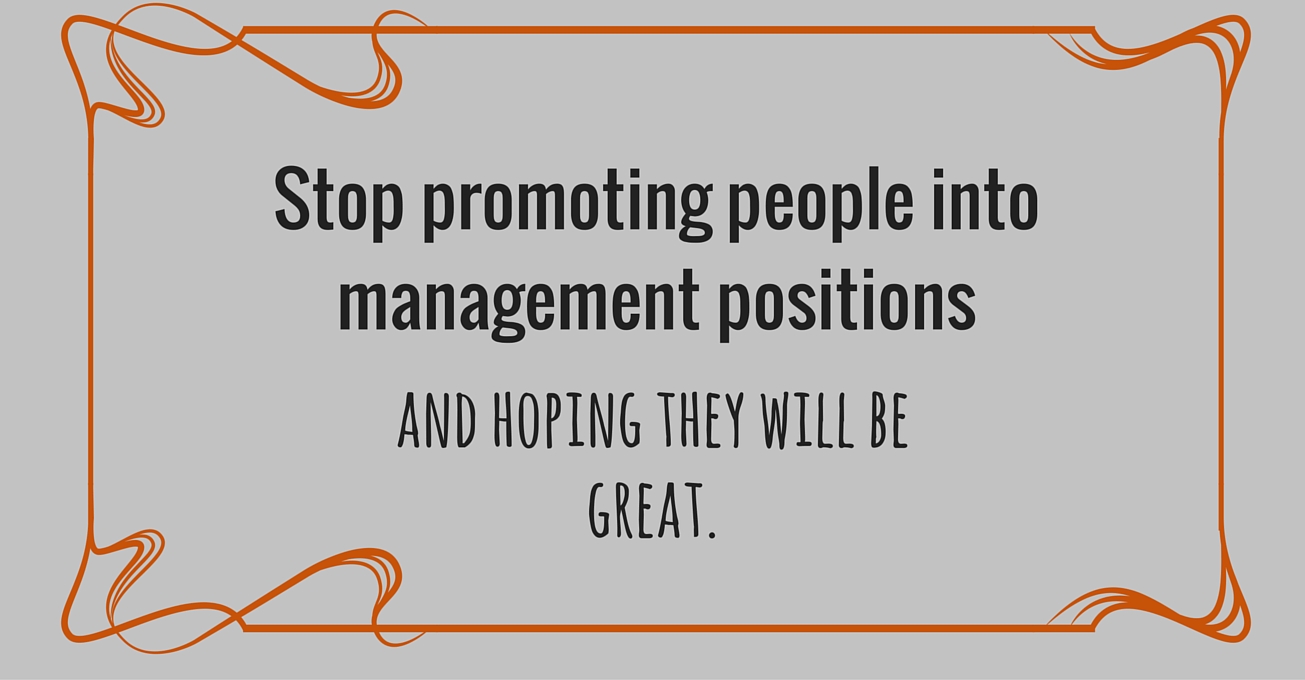Many years ago, I worked for a manager who had an unusual talent.
He could suck the enthusiasm out of a room before he even got to his desk. It got so bad that no one booked vacation without first knowing the dates he would be away. When he wasn’t there we loved our job. None of us wanted to be absent for those weeks.
And we have all had bosses like that I am sure. Forget how great the company is, it’s the direct manager that makes the difference.
Bob Kelleher in his video Who’s Sinking Your Boat noted that
“35% of US workers said they’d willingly forgo a substantial pay rise to see their direct supervisor fired”
Ouch!
Why Are Companies Getting The ‘Management’ Thing So Wrong?
I came across this Gallup article on management talent, and I found their findings quite shocking
“Only 1 in 10 people have the talent to manage”
It is no wonder, therefore, they found that
“Companies fail to choose the candidate with the right talent for the job 82% of the time”
Whilst a number of people have some of the strengths, few have enough to significantly improve the company’s performance. The few are the ones that naturally engage team members, retain top talent and create an environment of high productivity
Talent is defined as the ‘natural capacity for excellence’ People can gain skills and experience, but they can’t gain talent. That is innate.
I find that a depressing thought. Only 10% of the workforce have the talent to be great managers? I won’t argue against Gallup’s research, but I think we are missing a trick here.
Even if the other 90% of your workforce wouldn’t make the ‘perfect’ manager, we can do a better job at creating some pretty darn good ones.
Build Yourself A Talent Pool
The key to this is to start early. Create a list of the members of your workforce that have yet to step into a manager role. It is time to watch out for how they demonstrate key leadership traits. There is, of course, psychometric testing that you can do to assess for these qualities. But not every company has the budget for them. And frankly if companies are only selecting the right manager 18% of the time, then something is still going wrong.
Don’t Just Promote Someone Because They ‘Deserve’ It
We have probably all been guilty of this in our time. You have someone on your team who does a really great job. He’s probably been with you a long time. So next time a ‘Managers’ job comes up, you think he should be promoted
But should he? Does he have the qualities needed to lead a team?
Perhaps you are scared of losing him if you don’t make him manager. But if he is not cut out to be a great people manager, how many of his team will you end up losing instead?
And that team member may not even want to manage people. He may just want a bit extra in his pay packet every month and some recognition for his expertise.
Understand Their Career Goals
Before you go any further, ask every one of your potential managers a simple question
Do you want to manage people?
Some won’t want to. If you are forcing a person into a role they have no desire for, don’t expect them to succeed. This often happens if there is no other route for progression. How can you change this? Neel Doshi and Lindsay McGregor, in their excellent book Primed to Perform, refer to BYOL (Bring Your Own Ladder)
“Rather than one path for all your people, your organization should enable people to design their own career ladder.”
They talk about creating experts in content knowledge and customer relationships. Find what motivates your team members and see them flourish as you help them develop in those areas.
What Should You Look For In A Future Manager?
Armed with a slimmed down pool of future team managers, it’s time to assess them against some key leadership traits.
In the article, Gallup identifies five talent dimensions proven to be the greatest predictors of outstanding management performance.
- Motivator
- Assertiveness
- Accountability
- Relationships
- Decision-Making
Are They Demonstrating These Behaviours?
Motivator – do they challenge themselves to continually improve? Are they able to motivate their team mates to do the same? Is their energy infectious?
Assertiveness – do they overcome challenges? Do they search for solutions rather than wallowing in problems? Do they make change happen?
Accountability – do they assume responsibility for their efforts? Do they look for ways they deliver on expectations?
Relationships – Have they built positive, engaging relationships? Have they built a strong network around them that will help each other out.
Decision-making – do they think ahead, plan for contingencies, take an analytical approach. Do they aim for the best solution not just the easiest one?
Create A Path For Your Future Managers
Be clear with your potential managers. Talk them through the behaviours you expect. Encourage them to find ways to demonstrate these qualities. Set time aside for them to discuss their progress with their manager. When a managerial role becomes available, there will be a pool of potential candidates who have been working towards this moment. And don’t just cherry pick from the group. Put them through a selection process (it is proven to be the most successful route over automatic promotion).
You can choose based on clear evidence. It is tempting to promote someone because they are good at their job or they have been with you a while. But just take a moment to remember the worst manager you have had. That’s probably exactly what happened to him.
Employees Leave Managers – So Choose The Right Ones
This activity will highlight two things
- It will be easier to spot the 10% of your workforce that are naturally talented at management
- You will identify the ones who don’t have natural talent in all five areas, but can be supported to grow where they are weaker. Gallup does state “that another two in 10 people exhibit some characteristics of basic managerial talent and can function at a high level if their company invests in coaching and developmental plans for them.”
And Don’t Underestimate The Other Benefits
– You will identify great internal candidates so you can promote from within. (This is proven to be more successful than hiring from outside.)
– You are giving your employees a clear message that you are serious about staff development and keeping great talent in your company.
– A good number of your employees will be working to improve their motivational skills, assertiveness, accountability, relationship building and decision-making. That will never be a bad thing, right?





